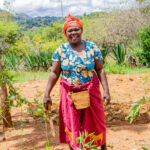
In early 2020, just as COVID-19 began to spread around the world, Eastern Africa and the Horn of Africa experienced an additional outbreak, this time of locusts. It was one of the worst outbreaks of desert locusts in Kenya in 70 years, and in Ethiopia and Somalia in over 25 years.
The outbreak has been linked to an increasing number of cyclones due to the changing climate. The locusts had an immediate impact on crops and food security in the region.
ACT forums in Ethiopia, Kenya, South Sudan and Uganda launched a regional appeal (HEA 201) to respond to the crises. The appeal covered affected regions in Ethiopia (Konso, South Omo and Borane), Kenya (Marsbit, Turkana, Kitui, Baringo Counties) and South Sudan (Magwi County, Eastern Equatorial State). Affected communities benefited from enhanced food security, investments in Water and Sanitation (WASH), and from funding for early recovery and livelihoods. Some funds helped enhance community resilience to COVID-19.
Enhanced food security
In Ethiopia, Christian Aid distributed cash to 400 families at risk of food shortages caused by locusts. “I was in a desperate situation when the committee selected me for the cash support,” said one of the community members to Christian Aid. She immediately used some cash to buy food for her family and more recently used the remainder to buy two young goats which will provide future income.
In South Sudan, The Lutheran World Federation (LWF) set up a project to support the most vulnerable people affected by the locusts. They received conditional cash assistance for food items and chicken farming. One person in each of a hundred households was identified and supported with cash to help meet their households’ basic food needs.
In Kenya the Anglican Development Service (ADS) prioritized the most vulnerable, and 330 households received cash assistance.
Early recovery and livelihood support
In Kenya, 800 households received early recovery seeds and learned to grow drought-tolerant crops thanks to a collaboration between Church World Service, the Anglican Church of Kenya in the Diocese of Kitui, and the Kitui County Ministry of Agriculture, Water & Livestock. Three varieties of crop seeds suited to the agro-ecological zone were distributed to local communities.
“When locusts invaded our farms, they ate everything, but now CWS has brought us seeds which will help us recover from the loss,” says one of the community members in this video by Church World Service.
In South Sudan LWF helped a community to establish tree nurseries which raised over 5233 tree seedlings, including mango, lemon, eucalyptus, guava, teak and coffee.
COVID-19 support
In response to the COVID-19 pandemic, ACT Alliance members also helped several communities with increased water supplies and hygiene training.